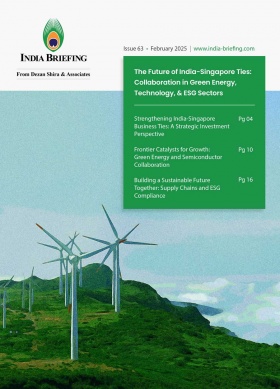India Simplifies Air Cargo Imports and Waives Transshipment Fees
In a major push towards easing logistics operations and boosting trade, India has introduced several trade facilitation measures, specifically targeting air cargo imports and transshipment processes.
To enhance trade facilitation and align with international best practices, India’s Central Board of Indirect Taxes and Customs (CBIC), under the Union Ministry of Finance, introduced a simplified and harmonized procedure for the temporary import of unit load devices (ULDs) and air cargo containers.
Under the revised framework announced on April 24 and 25, 2025, air carriers and air console agents can temporarily import ULDs outside the customs area by executing a continuity bond and must re-export the units within the prescribed timeframe.
ULDs serve as specialized containers for transporting goods aboard aircraft and play a vital role in ensuring efficient air cargo logistics.
The Union Ministry of Finance emphasized that these changes mark an important step toward modernizing customs protocols and streamlining procedures. Alongside the procedural changes for ULDs, the indirect tax board also announced the waiver of the transshipment permit fee for all transshipment movements, aiming to further facilitate faster cargo movement.
READ: Import and Export Procedures in India
Waiver of transshipment permit fee
On April 24, 2025, the CBIC issued the Goods Imported (Conditions of Transshipment) Regulations, 2025, through Notification No. 30/2025-Customs (N.T.), introducing key changes under the Customs Act, 1962.
Effective from the date of publication, i.e., April 24, 2025, no fees will be charged for applications related to the transshipment of imported goods across all customs stations. During customs clearance, logistics operators often move imported cargo between different customs locations — such as ports, container freight stations, and inland container depots—and a fee of INR 20 (US$0.23) is charged per permit.
India simplifies procedure for import of ULDs
In a separate notification issued by the CBIC on April 25, 2025, India has streamlined the procedure for the temporary import of ULDs outside India’s customs areas. Under the new process, air carriers and console agents can temporarily import ULDs by executing a continuity bond and must ensure their re-export within the specified time frame.
A continuity bond serves as a financial guarantee that air carriers or agents submit to the customs authorities, covering multiple shipments or transactions over a specified period and removing the need for a separate bond for each individual movement.
The CBIC further specified in the notification that tracking devices attached to ULDs must carry identifiable Unique Identity Numbers (UINs) and must comply with the security regulations established by the Bureau of Civil Aviation Security (BCAS), under the Union Ministry of Civil Aviation.
Air carriers or console agents now bear the primary responsibility for ensuring the timely re-export of ULDs. However, the CBIC clarified that importers may also choose to assume responsibility for re-export if they prefer.
Additionally, the CBIC clarified that the exemption for temporary import does not extend to tracking devices imported separately from ULDs. In such cases, or when importers manage the temporary import directly, the existing procedures will continue to apply.
Online filing of transshipment applications via ICEGATE
India has introduced online filing of transshipment applications through the ICEGATE platform. This initiative eliminates the need for stakeholders to physically visit service centers at air cargo complexes.
To utilize this facility, users must first register on the ICEGATE portal. Once registered, the user can access the services section and select the appropriate web form—such as the Export Transshipment (ETP) form for specific categories like Special Economic Zone (SEZ) users. Applicants can find the necessary details and upload the required supporting documents by referring to the user manual for the ETP Webform for SEZ users.
Guide for filing transshipment applications
- Step 1: Visit the ICEGATE website and complete the user registration process; click here: Registration on ICEGATE.
- Step 2: Log in to your account using your registered credentials.
- Step 3: Navigate to the “Services” tab on the webpage; check out the “Electronic Filing” option.
- Step 4: Choose the correct web form applicable to your transshipment needs (for example, the ETP form for SEZ users).
- Step 5: Enter the required information and upload any supporting documents as instructed in the form.
- Step 6: Review and submit your completed application through the ICEGATE portal.
ALSO READ: The Special Valuation Branch (SVB) in India: FAQs
Conclusion
The latest measures introduced by India indicate a step toward the modernization of customs procedures in the country. By streamlining the temporary import process for ULDs, waiving transshipment permit fees, and facilitating online filing through the ICEGATE platform, the reforms aim to enhance efficiency, reduce compliance costs, and support seamless cargo movement. These initiatives are intended to align India’s trade facilitation practices more closely with international standards and to address the operational needs of a growing trade environment.
(US$1 = INR 85.02)
About Us
India Briefing is one of five regional publications under the Asia Briefing brand. It is supported by Dezan Shira & Associates, a pan-Asia, multi-disciplinary professional services firm that assists foreign investors throughout Asia, including through offices in Delhi, Mumbai, and Bengaluru in India. Readers may write to india@dezshira.com for support on doing business in India. For a complimentary subscription to India Briefing’s content products, please click here.
Dezan Shira & Associates also maintains offices or has alliance partners assisting foreign investors in China, Hong Kong SAR, Dubai (UAE), Indonesia, Singapore, Vietnam, Philippines, Malaysia, Thailand, Bangladesh, Italy, Germany, the United States, and Australia.
- Previous Article Skilling and Diversity Takes Centre Stage in India’s Semiconductor Landscape
- Next Article








